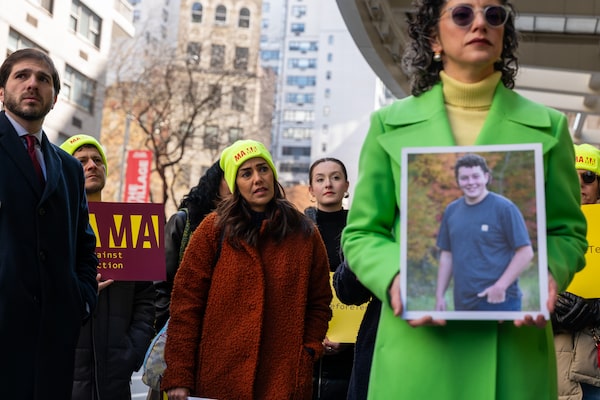
A picture of 15-year-old Riley, who died by suicide after falling victim to online bullying on Facebook, is held up as members of Mothers Against Media Addiction rally outside of Meta's New York offices in support of putting kids before big tech on March 22 in New York City.Spencer Platt/Getty Images
Lawsuits filed by four of the country’s largest school boards that accuse social media giants of harming the mental health of students and disrupting learning underscore the urgent need for more stringent government policy on online content being served to children, experts say.
In four separate statements of claim filed last week in the Ontario Superior Court of Justice, the Toronto District School Board, the Toronto Catholic District School Board, the Ottawa-Carleton District School Board and the Peel District School Board accused the companies behind Facebook, Instagram, Snapchat and TikTok of negligently designing products that rewire student behaviour.
The boards say the compulsive use of social media platforms has strained their limited resources. Staff spend more time addressing aggressive behaviour and incidents of cyberbullying. School boards are forced to invest in more mental-health programs and personnel, as well as cybersecurity.
The boards are advancing combined claims of about $4.5-billion. None of the allegations has been proven in court.
Are tech companies to blame for smartphone use in schools? Globe readers share their thoughts
The lawsuits mirror ones filed in the United States in recent months by individual states and school districts. Taylor Owen, a professor and director of the Centre for Media, Technology and Democracy at McGill University, said the lawsuits are not unexpected given that policymakers have left this space ungoverned.
“Schools are struggling with this problem and not getting a lot of help from governments,” Prof. Owen said.
Governments should take steps to “raise the bar on safety,” he said, adding that they can force companies to implement design features that don’t allow adults to directly message children, for example, or stop algorithmic recommendations for kids.
“The clear lesson for the past decade is that meaningful change on child online safety from social media companies only comes when they are forced, either through public outrage or strong regulation.”
The four boards filed lawsuits against Meta Platforms Inc. META-Q, which is responsible for Facebook and Instagram, Snap Inc. SNAP-N, the parent company of Snapchat, and ByteDance Ltd., the owner of TikTok. “The Defendants have acted in a high-handed, reckless, malicious, and reprehensible manner without due regard for the wellbeing of the student population and the education system,” the lawsuits state.
In response, TikTok spokeswoman Danielle Morgan said the app has safeguards in place, including parental controls and an automatic 60-minute screen time limit for users under 18. “Our team of safety professionals continually evaluate emerging practices and insights to support teens’ well-being and will continue working to keep our community safe,” she said in an e-mailed statement.
Similarly, Tonya Johnson, a spokeswoman for Snap, said that “while we will always have more work to do, we feel good about the role Snapchat plays in helping close friends feel connected, happy and prepared as they face the many challenges of adolescence.”
Meta did not respond to requests for comment.
Several provinces, including Ontario and Quebec, have attempted to restrict cellphone use in schools. However, Kaitlynn Mendes, an associate professor of sociology at Western University and the school’s Canada research chair in inequality and gender, says governments and educators should teach children digital literacy skills and how to manage their behaviour and feelings on social media rather than simply ban the devices or platforms.
Prof. Mendes’s research focuses on tech-facilitated sexual violence and how it’s being addressed in schools. Social media are not necessarily bad, she says, but an algorithm that suggests content based on a user’s viewing history has toxic characteristics.
Cellphone use in schools should be restricted, not banned, educators say
She and her colleagues led focus groups with about 150 teens in Ontario, Alberta, Nova Scotia, Quebec and Yukon. The teens shared how social media served as lifelines that kept them connected with family and friends. They also discussed how the apps are addictive and anxiety-inducing. Almost every boy had been catfished or knew someone who had been, Prof. Mendes said. (Catfishing is when a person sets up a false identify online and uses it to trick, harass or control others.) Many girls spoke about men sending them unwanted pictures and asking for intimate images in return.
The platforms “don’t care about your well-being. They don’t care if they’re feeding you content that might be harmful or upsetting or disturbing or weird. They just want your eyeballs on the screen for as long as possible and they’re going to do whatever it takes, partly because there’s so little moderation,” she said.
“If there’s nothing to hold them [the companies] accountable, they’re not really going to make the necessary changes. So government needs to pay attention, government needs to listen to this and recognize, again, that young people are vulnerable in many ways. And we need to do more.”
Cellphone ban in schools cuts off support, experts say
Philip Mai, co-director of the Social Media Lab at Toronto Metropolitan University, explained that the apps almost give children and young people a “dopamine hit” when their actions and activities are validated. Children are particularly vulnerable because their brains are still developing. They are still learning to self-regulate and developing self-esteem, he added.
Mr. Mai believes the lawsuits will not be a “slam dunk” for either side. Many studies show a correlational link between social media and mental health, not a causal one.
Still, he said, lawsuits initiate public discourse, which could force social media companies to at least appear to take steps to address concerns. It could also push governments to act and enact policies around social media use and young people.
“It’s not for nothing,” Mr. Mai said.